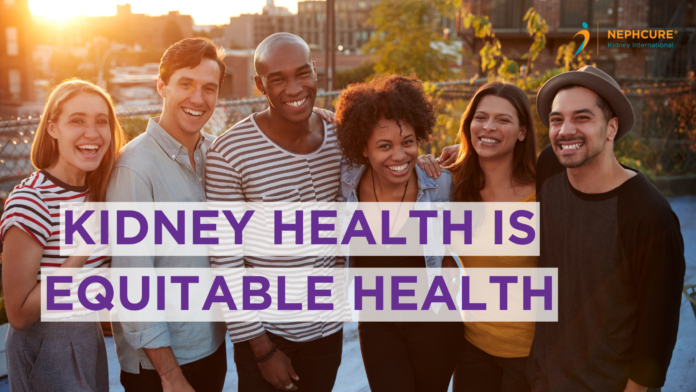Across the U.S., a collective effort is underway to achieve health equity by mitigating disparity factors in the patient population, and NephCure Kidney International has joined the fight. The King of Prussia, Pa.-based nonprofit aims to accelerate research for effective treatments targeting rare forms of kidney disease and provide education and support to impacted patients. Deja Ivy, NephCure’s Associate Director of Community Health, spoke to Black Health Matters about her organization’s mission and approach, particularly in the Black community.
Black Health Matters: How important is NephCure’s work in the Black community?
Deja Ivy: Black people account for 13% of the population, but we are 32% of chronic kidney patients. When you walk into the dialysis center, you see so many of us, you see the health disparities plainly. Of the rare diseases NephCure focuses on, focal segmental glomerulosclerosis (FSGS), a rare disease that affects the filters in your kidneys, is the one that impacts the Black community the most. There’s a hereditary component that makes you five times more likely to experience kidney failure and need dialysis. But if FSGS is caught early, it’s possible to stop or slow the damage and live a regular life. Our work is important because of the low quality of life for people on dialysis, but we’re also advocating for people to be aware and proactive in their kidney health.
Black Health Matters: What is NephCure’s outreach strategy?
Deja Ivy: Our strategy is to find trusted community partners to collaborate with to get the message out thatwe should be aware of FSGS. The conversations and research are happening—just not in the Black community. So, we work with churches, community centers, and online forums. In Atlanta, for instance, we have Cultural Conversations with Black kidney doctors and Black FSGS patients and monthly health fairs where doctors and nurses offer support. We’re about to roll out a community screening program where we offer urine tests to find out how much protein is in the urine, which indicates kidney disease, and genetic testing.
Black Health Matters: How is NephCure’s approach unique?
Deja Ivy: We’re unique because we meet patients and those at risk where they are by using different platforms to help people to start the discussion. We have webinars, educational articles, blog posts, support groups, and our Kidney Health Gateway, which connects people to top nephrologists and research. We really try to be a safe space for people with rare kidney disease. The safe space is needed because some people are embarrassed about having kidney disease. Others are confused about their kidneys, even those who have been diagnosed for some time. We’re just getting used to talking about diabetes and hypertension in our community, so we now need to get comfortable talking about kidney disease.
Black Health Matters: Part of your work is to increase awareness of clinical trials to underrepresented groups. How important is that?
Deja Ivy: It’s important for two reasons. First, the Black community has experienced plenty of burdens with clinical trials and research, but we haven’t received the benefit of it. There are many cutting-edge and life-saving treatments we could benefit from. Second, when we talk about therapies and treatments, we need to understand how we’re being impacted, and that understanding comes from clinical research. Black people are much more likely to have the APOL1 gene (a high-risk genotype present in about 75% of Black patients with FSGS) and a higher risk of developing kidney disease because of our ancestry. We need to participate and be included in research (and the same can be said for other underrepresented groups).
Black Health Matters: How is NephCure moving the needle?
Deja Ivy: I would say more broadly that we’re building a presence of color in this conversation. People are engaging, and they’re having conversations with their families. They’re going back to the community organizations and sharing when they’re having issues and experiencing barriers in their treatment. And that’s what’s moving the needle. In our Atlanta program, we have a young Black male in his early 20s with FSGS and APOL1. He shared his fears of clinical trials and his embarrassment and shame for having it. We’re helping to get people to feel comfortable talking about it—and that’s progress.





